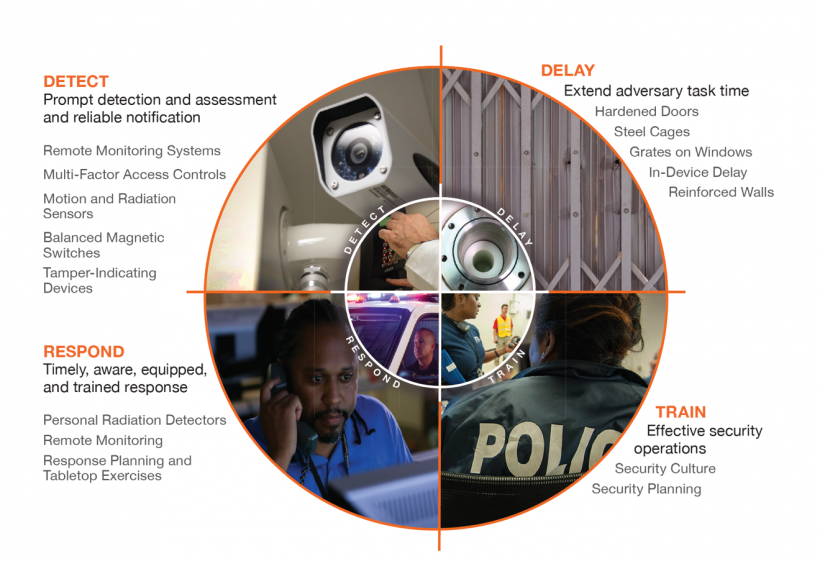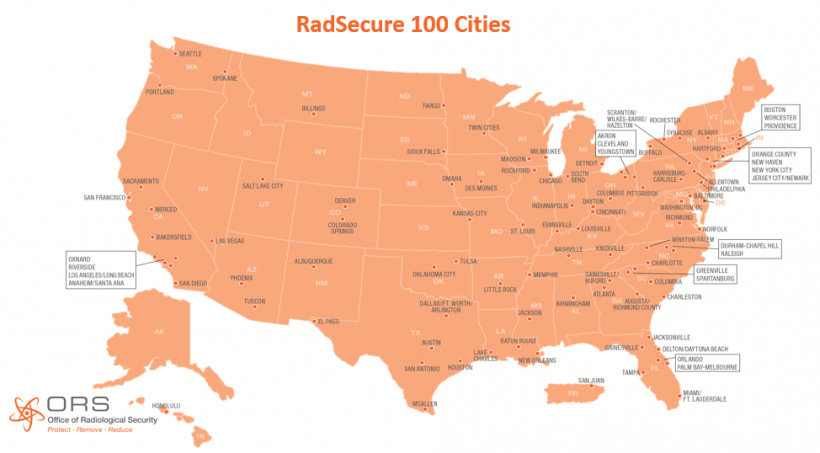RadSecure 100 targets 100 metropolitan areas across the United States by replacing some devices with alternatives that are less dangerous and, in other cases, by funding security enhancements to facilities that use high-activity radioactive materials and businesses that use mobile radioactive sources. Additionally, the initiative will provide training for facilities’ security personnel and local law enforcement.
The Department of Energy’s National Nuclear Security Administration (DOE/NNSA) is underway with a new major radiological security project to enhance U.S. radiological security. The RadSecure 100 Initiative focuses on removing radioactive material from facilities where feasible and improving security at the remaining facilities located in 100 metropolitan areas throughout the United States. It includes a significant partnership with local law enforcement.
“Radioactive materials can be used to do a lot of good: treating cancer, irradiating blood, searching for oil, and ensuring buildings are constructed safety,” said Kristin Hirsch, the Director of ORS. “But if a terrorist obtained these materials, they could set off a radiological dispersal device (RDD), or ‘dirty bomb.’ In a big city, that could have devastating consequences. RadSecure 100 works to eliminate that threat.”
The initiative focuses on enhancing radiological security in facilities in 100 U.S. cities that contain the highest priority materials, including:
- cesium-137
- cobalt-60
- americium-241
- iridium-192
RadSecure 100 will reduce risk by replacing the material or securing it. It will:
- Replace radiological devices with alternative technologies that do not require a radioactive source and, removing any unneeded sources.
- Improve the security of radiological facilities and mobile sources.
- Work with law enforcement to plan and train how to respond in case of theft.
Removing the Threat
ORS works with local governments, businesses, medical and educational institutions, and non-profit partners to reduce risk by removing the highest risk radioactive materials.
- The Cesium Irradiator Replacement Project will help businesses that choose to replace cesium-137 irradiators with other technologies, like X-ray.
- The Off-Site Source Recovery Program provides removal, transportation, and safe and secure disposition of high-activity radioactive sources – including cesium-137 irradiators.
Securing What’s There
If ORS can’t eliminate the risk, it works to make the material more secure. It provides an assessment of the facility’s existing security and supports enhancements and training to address a range of threats.
The office continues to develop strategies and tactics to address new and emerging threats, such as cybersecurity, for all ORS partners and facilities that use high-activity radioactive sources.
When sources are in transit or bring used in the field, they are especially vulnerable to theft. For that reason, RadSecure 100 Initiative also focuses on transportation security. By working together with industrial and commercial users, carriers, and others, ORS finds solutions to these challenges. The program offers insider threat mitigation, security training, and analysis to better understand risks associated with transportation routes or working locations. Mobile Source Security aims to improve security for radioactive sources that are used in the well-logging and industrial radiography industries.

Working with Law Enforcement
Facilities with radioactive materials depend on local law enforcement to respond quickly in case of an attempted theft.
A major part of RadSecure 100 is working hand in hand with local law enforcement in 100 targeted metropolitan areas to enhance response capabilities.
Support includes response training and exercises, including Alarm Response Training, Personal Radiation Detector Training, and Tabletop Exercises.
Radiological Security Awareness Response Training enables local law enforcement to implement their own tailored training programs with ORS-supplied equipment, such as mock irradiators, trailers, and training videos as needed.
ORS also supplies the Sentry Remote Monitoring System, which provides law enforcement with immediate notification of a theft as well as situational awareness.
Is Your City a RadSecure 100 City?
NNSA will be implementing RadSecure 100 in the following metropolitan areas:
Alabama
- Birmingham
Arkansas
- Little Rock
Arizona
- Phoenix
- Tucson
California
- Anaheim/Santa Ana
- Bakersfield
- Los Angeles/Long Beach
- Merced
- Oxnard
- Riverside
- Sacramento
- San Diego
- San Francisco/Bay Area
Colorado
- Colorado Springs
- Denver
Connecticut
- Hartford
- New Haven
District of Columbia
- National Capital Region
Florida
- Deltona/Daytona Beach
- Gainesville
- Jacksonville
- Miami/Ft. Lauderdale
- Orlando
- Palm Bay-Melbourne
- Tampa
Georgia
- Atlanta
- Augusta
- Buford
Hawaii
- Honolulu
Iowa
- Des Moines
Illinois
- Chicago
- Rockford
Indiana
- Indianapolis
- Evansville
- South Bend
Kentucky
- Louisville
Louisiana
- Baton Rouge
- New Orleans
- Vinton
Massachusetts
- Boston
- Worcester
Maryland
- Baltimore
Michigan
- Detroit
Minnesota
- Minneapolis/St. Paul
Missouri
- Kansas City
- St. Louis
Mississippi
- Jackson
Montana
- Billings
North Carolina
- Charlotte
- Durham/Chapel Hill
- Raleigh
- Winston-Salem
North Dakota
- Fargo
Nebraska
- Omaha
Nevada
- Las Vegas
New Jersey
- Jersey City/Newark
New Mexico
- Albuquerque
New York
- Albany
- Buffalo
- New York
- Poughkeepsie/Newburgh/Middletown
- Rochester
- Syracuse
Ohio
- Akron
- Cincinnati
- Cleveland
- Columbus
- Dayton
- Dublin
Oklahoma
- Oklahoma City
- Tulsa
Oregon
- Portland
Pennsylvania
- Allentown
- Harrisburg/Carlisle
- Philadelphia
- Pittsburgh
- Wilkes-Barre/Ashley
Puerto Rico
- San Juan
Rhode Island
- Providence
South Carolina
- Charleston
- Columbia
- Greenville
- Spartanburg
South Dakota
- Sioux Falls
Tennessee
- Knoxville
- Memphis
- Nashville
Texas
- Austin
- Dallas/Fort Worth/Arlington
- El Paso
- Houston
- McAllen
- San Antonio
Utah
- Salt Lake City
Virginia
- Norfolk
- Richmond
Washington
- Seattle
- Spokane
Wisconsin
- Madison
- Milwaukee
Story adapted from press and YouTube videos from the National Nuclear Security Administration



